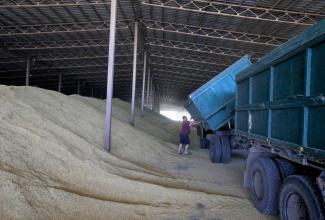Geopolitics
The strategic relevance of Ukrainian grain

Even before the war, food security was precarious for millions of people, but now food price inflation is making things more difficult. The World Food Programme (WFP) sees an additional 345 million people in 82 countries at severe risk of hunger. The war is not the only reason. The Covid-19 pandemic has had negative impacts on agricultural production and supply chains. The climate crisis matters too. Harvests are increasingly failing because of extreme weather. Worried about satisfying their own nation’s demand, moreover, some governments have discontinued grain exports. As a result, global prices keep rising, adding to the problems in countries that depend on imports.
Stored grain
More than 20 million tonnes of grain are currently being stored in Ukraine and not available to international buyers. Ukrainian farmers lack storage capacity for the next harvest. Moreover, Russian attacks are making farm work difficult or impossible in Ukraine. All of this will reduce international cereals supply in the not so distant future (see Claudia Isabel Rittel on www.dandc.eu).
Compounding problems, fertiliser has become more expensive around the world. Much of it is produced in Russia. Agriculture is affected in many developing countries and emerging markets. Higher fuel prices have similar detrimental impacts. Access to 20 million tonnes of grain from Ukraine would reduce – though not end – the current stress on the world market. Turkey is hosting negotiations in Istanbul and acting as a mediator with an eye to ending the blockade of the Black Sea. Both warring parties are involved, and so is the UN. Success would be a good omen for international cooperation.
No solution?
Unfortunately, success does not look likely for both political and practical reasons. There are some proposals, such as the British navy accompanying merchant vessels through the Black Sea or the Turkish navy checking those ships for weapons. So far, however, such ideas have been rejected either by Ukraine or Russia. Moreover, Moscow wants Ukraine to demine its ports, but Kiev refuses to do so. That would make attacks by Russian warships easier. For good reason, the Ukrainian government does not trust the Russian regime. After all, Russia has broken international law by invading Ukraine.
emining, moreover, would take too long for quick relief. It also matters that private companies, not governments, ship commodities. These companies would have to run the risk of operating in a war zone. Their insurance premiums would rise, further adding to the costs.
To some extent, the underlying problem is logistics. There is no realistic alternative to maritime transportation. Theoretically, land routes can be considered, for example via Poland. Existing infrastructure, however, is insufficient for transporting such large volumes of grain by train and truck. Moreover, customs issues would arise at borders. Grain exports from Ukraine would thus take longer and become more expensive.
It probably matters even more that Moscow may not really be interested in a negotiated agreement. The regime of Vladimir Putin is exploiting the narrative of European adventurism causing global shortages and inflation. According to Moscow’s propaganda, NATO and the EU are to blame for increasingly desperate need. It is doing its best to deflect attention from three basic facts:
- Russia, previously a major grain exporter itself, has stopped supplying this commodity to the world market.
- It is preventing Ukrainian exports. And it is benefiting from higher energy prices.
It is true, however, that western sanctions have contributed to the increase of fertiliser prices.
Western governments cannot prevent Russia from using hunger in ways that destabilise international relations, but they must respond competently. They should do whatever they can to get a grip on the food-security crisis. Dennis J. Snower of the Kiel Institute for the World Economy has a point when he praises the G7 summit in Bavaria for unambiguously siding with Ukraine, but also admonishes the leading western powers to pay close attention to famines and food security internationally.
Jane Escher is a public-relations trainee at Engagement Global.
jane.escher@engagement-global.de






